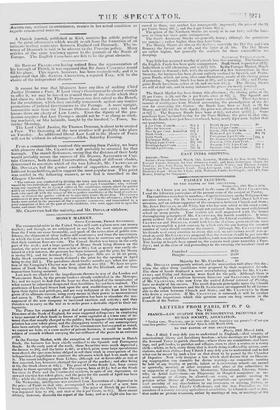PAISLEY ELECTION.
TO THE EDITOR OF TIIE SPF:CTATOR.
wethicsday. 10th Mandl 1534.
SIR—As I know you are intereatell in the cause of Mr. „loons. Clean-Yuan, I send the following particulars of the present state of the contest at Paisley. The candidates were four in num ber,—Cap tai to (ivaurums on the Religious Con- servative interest; Sir D. SANDFORD, a " Trio tttttttttt half- Liberal half-Con- servative, and an ardent supporter of the connexiiin between I %torch and State ; Mr. Jolts Dour:Las, an old Whig. but who has now added to his creed a con- siderable spic • of Itulicalism,—though not gatliered from the must enlightened school on many points. Your readers are well acquainted with the honest thoroughgoing principles of Mr. CR.% WFI' RD, the finartio candidate. It being pretty evident that if all four came to the poll, the Liberal candidates, Messrs. CRAWFORD antl Doecrias, would both lose the election, great exertions were made to accomplish a joint canvass, his' which only the mie having the greatest number of votes should eontionte the contest. Although Mr. CILAWFUR I, and his friends used every exertion to attain this end, uuur satisfictory result was ar- rived at, until 3Ir.Cita Werra D proposed that the decision should be put, into the hands of the whole inhabitant householders, bath non-eleetors as well as electors. This having at length been agreed to, the canvass took place yesterday ('foes- day); and at the close of thel proceedings in the evening, the numbers stood as follow— Crawford 2675 Douglas •tet0 Majority for Mr. Crawford 45 Mr. Douer As consequently retired, and the nomination took place this ilav ; when the other three Itandidatea were proposed by their respective frinttle. 'fire show of hands displayed a most overwhelming majority for Mr. CRAW- FORD; and Friday and Saturday were fixed for the poll. Although there is every probability of a coalition between GORDON and SA NI:Forth, the friends of Mr. CRAWFORD, who now form the united Liberal interest of Atisley, have no doubt of his success. The result depends principally upon the Church question. Citetain GORDON and Sir D. SA N DroRD are supported by all thyour- able to the union between Church and State; and Mr. CRAWFORD by those who desire a sepitrir.ion. If Mr. CRAWFORD is returned, it will be another proof of the importance which this question must ere long assume in the




















 Previous page
Previous page